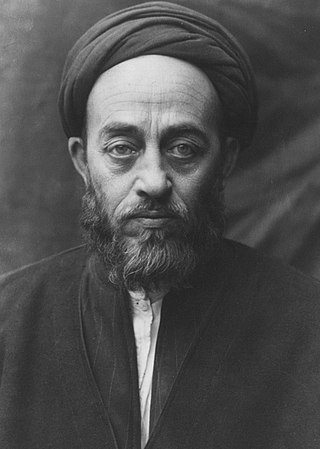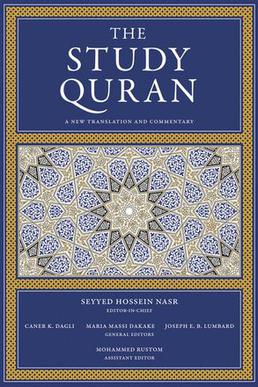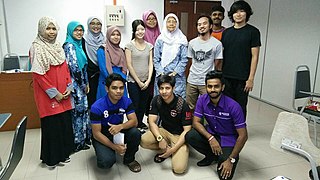Related Research Articles

Seyyed Hossein Nasr is an Iranian philosopher and University Professor of Islamic studies at George Washington University.

Muhammad Husayn Tabataba'i or Sayyid Mohammad Hossein Tabataba'i was an Iranian scholar, theorist, philosopher and one of the most prominent thinkers of modern Shia Islam. He is perhaps best known for his Tafsir al-Mizan, a twenty-seven-volume work of tafsir, which he produced between 1954 and 1972. He is commonly known as Allameh Tabataba'i and the Allameh Tabataba'i University in Tehran is named after him.
Ramin Jahanbegloo is an Iranian philosopher and academic based in Toronto, Canada.
Avicennism is a school of Persian philosophy which was established by Avicenna. He developed his philosophy throughout the course of his life after being deeply moved and concerned by the Metaphysics of Aristotle and studying it for over a year. According to Henry Corbin and Seyyed Hossein Nasr, there are two kinds of Avicennism: Islamic Avicennism, and Latin Avicennism. According to Nasr, the Latin Avicennism was based on the former philosophical works of Avicenna. This school followed the Peripatetic school of philosophy and tried to describe the structure of reality with a rational system of thinking. In the twelfth century AD, it became influential in Europe, particularly in Oxford and Paris, and affected some notable philosophers such as Thomas Aquinas, Roger Bacon and Duns Scotus. While the Latin Avicennism was weak in comparison with Latin Averroism, according to Étienne Gilson there was an "Avicennising Augustinism". On the other hand, Islamic Avicennism is based on his later works which is known as "The Oriental Philosophy". Therefore, philosophy in the Eastern Islamic civilization became close to gnosis and tried to provide a vision of a spiritual universe. This approach paved the road for the Iranian school of Illuminationism by Suhrawardi.
M. Ali Lakhani, is a writer, lawyer, and editor whose works focus on metaphysics and the perennial principles found in the wisdom traditions of the world.

The Study Quran: A New Translation and Commentary is a 2015 English-language edition of the Quran edited by Seyyed Hossein Nasr and published by HarperOne. Caner Dagli, Maria Massi Dakake, and Joseph Lumbard prepared the translation, wrote the commentary, and also served as general editors, and Mohammed Rustom contributed as an assistant editor. Alongside a new English translation and extensive commentary, The Study Quran features numerous essays, maps, and other material.

Zailan Moris is a Malaysian scholar of Islamic philosophy and former professor of the School of Humanities at the University Sains Malaysia. Her main interests are Islamic philosophy, comparative religion and Sufism.
Gisela Goodrich Webb is an American scholar of comparative religion and professor emerita of religious studies at Seton Hall University in South Orange, New Jersey. Her works mainly focus on the intellectual and mystical traditions of Islam, Muslim women's rights and Islam in America.
In traditionalist philosophy, desacralization of knowledge or secularization of knowledge is the process of separation of knowledge from its divine source—God or the Ultimate Reality. The process reflects a paradigm shift in modern conception of knowledge in that it has rejected divine revelations as well as the idea of spiritual and metaphysical foundations of knowledge, confining knowledge to empirical domain and reason alone. Although it is a recurrent theme among the writers of the Traditionalist school that began with René Guénon, a French mystic and intellectual who earlier spoke of "the limitation of knowledge to its lowest order", the process of desacralization of knowledge was most notably surveyed, chronicled and conceptualized by the Iranian philosopher Seyyed Hossein Nasr in his 1981 Gifford Lectures that were later published as Knowledge and the Sacred.
Caner Dagli is a Circassian-American Islamic scholar and associate professor of Religious Studies at the College of the Holy Cross in Worcester, Massachusetts.
Knowledge and the Sacred is a 1981 book by the Iranian philosopher Seyyed Hossein Nasr. It was originally presented as his Gifford Lectures, which he delivered in 1981. The book is an exposition of perennial philosophy and has been described as a summa of the traditional perspective. It reflects Nasr's desire to revive what he refers to as the sacred quality of knowledge as opposed to knowledge based on sense perception and reason.
Adnan Aslan is a Turkish Islamic scholar.
In perennial philosophy, scientia sacra or sacred science is a form of sacred knowledge that lies at the heart of both divine revelations and traditional sciences. It recognizes sources of knowledge other than those recognized by modern epistemology, such as divine revelations and intellectual intuition, the latter of which is considered a supra-rational form of knowledge based on the human intellect. Scientia sacra embodies principles and doctrines derived from reason, revelation and intellectual intuition, with the conviction that these sources of knowledge can be reconciled without conflict in a hierarchical order and employed in the human quest to understand different orders of reality. It views the universe as a unified reality centered on God—the Ultimate Reality—whose knowledge is beyond the reach of sense perception and reason. This notion may be traced back to traditional cultures and civilizations, particularly Islamic tradition, which was primarily conceptualized in contemporary language by the Iranian philosopher Seyyed Hossein Nasr in his book Knowledge and the Sacred, originally published in 1981, containing his Gifford Lectures delivered that same year.
In perennial philosophy, tradition means divinely ordained truths or principles that have been communicated to humanity as well as an entire cosmic sector through various figures such as messengers, prophets, avataras, the Logos, or other transmitting agencies. According to this perspective, tradition does not refer to custom, habit, or inherited ways of thinking and living. Contrarily, it has a divine foundation and involves the transmission of the sacred message down through the ages. Used in this sense, tradition is synonymous with revelation, and it encompasses all forms of philosophy, art, and culture that are influenced by it.
In traditionalist philosophy, pontifical man is a divine representative who serves as a bridge between heaven and earth. Promethean man, on the other hand, sees himself as an earthly being who has rebelled against God and has no knowledge of his origins or purposes. This concept was notably developed in contemporary language by the Iranian philosopher Seyyed Hossein Nasr.
Resacralization of nature is a term used in environmental philosophy to describe the process of restoring the sacred quality of nature. The primary assumption is that nature has a sanctified aspect that has become lost in modern times as a result of the secularization of contemporary worldviews. These secular worldviews are said to be directly responsible for the spiritual crisis in "modern man", which has ultimately resulted in the current environmental degradation. This perspective emphasizes the significance of changing human perceptions of nature through the incorporation of various religious principles and values that connect nature with the divine. The Iranian philosopher Seyyed Hossein Nasr first conceptualized the theme of resacralization of nature in contemporary language, which was later expounded upon by a number of theologians and philosophers including Alister McGrath, Sallie McFague and Rosemary Radford Ruether.
In traditionalist philosophy, resacralization of knowledge is the reverse of the process of secularization of knowledge. The central premise is that knowledge is intimately connected to its divine source—God or the Ultimate Reality—which has been severed in modern times. The process of resacralization of knowledge seeks to reinstate the role of intellect above and beyond that of reason, as well as to revive the role of traditional metaphysics in acquiring knowledge—especially knowledge of God—by drawing on sacred traditions and sacred science that uphold divine revelations and the spiritual or gnostic teachings of all revealed religions. Iranian philosopher Seyyed Hossein Nasr elaborated on the process of resacralization of knowledge in his book Knowledge and the Sacred, which was presented as Gifford Lectures in 1981.
The Need for a Sacred Science is a 1993 book by the Iranian philosopher Seyyed Hossein Nasr.
Science and Civilization in Islam is a 1968 book by the Iranian philosopher Seyyed Hossein Nasr.
Islam in the Modern World: Challenged by the West, Threatened by Fundamentalism, Keeping Faith with Tradition is a 2012 book by the Iranian philosopher Seyyed Hossein Nasr.
References
- ↑ MacDonald 2011, pp. 132–135.
- ↑ Mirtaheri 2012, pp. 590–592.
- ↑ Dagli 2014, pp. 225–227.
- ↑ Lakhani 2010, pp. 193–199.